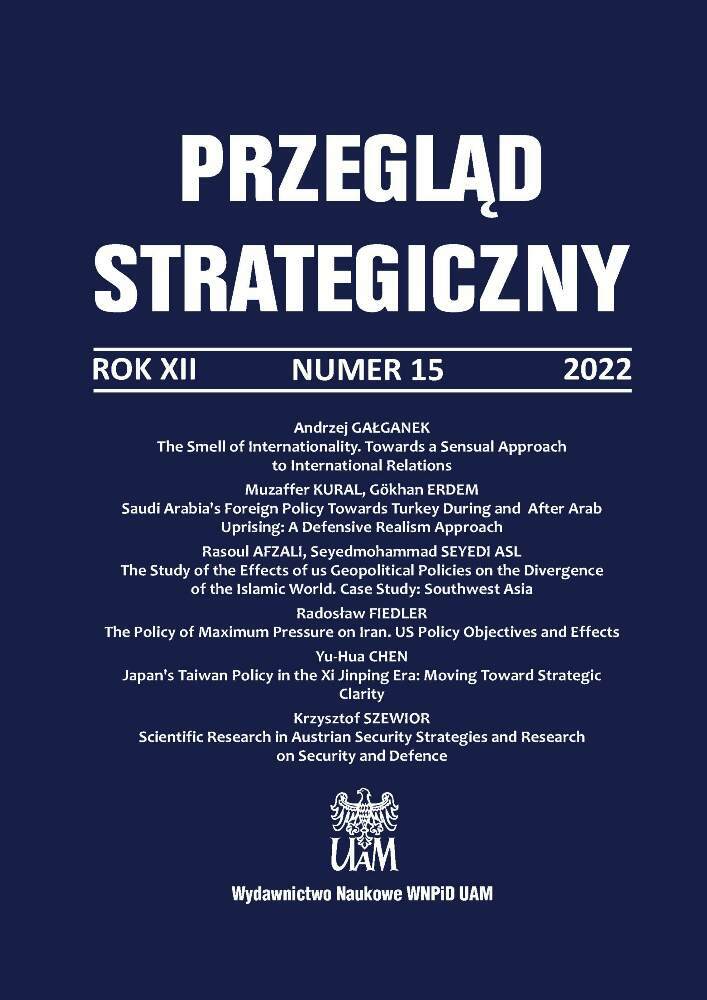Abstract
The efficiency and effectiveness of the international non-governmental organisations (INGOs) in ensuring peace and security as relevant and growing only in dynamic interaction and cooperation with other international actors (international governmental organisations, non-governmental actors, and civil society institutions) have been justified. The features, models and problems of interaction of INGOs with other international actors in maintaining peace, stability and security, solving and preventing modern security challenges of the international system have been comprehensively studied. Such interaction and coordination of the efforts of INGOs and other international actors is viewed through the prism of expanding the areas of competence of non-governmental international organisations and increasing their activity in various areas. Some examples of an active involvement of non-governmental organisations in the activities of the UN (and its structures), NATO, OSCE, CoE, EU are given. Challenges of the interaction of governmental and non-governmental sectors in the international arena are analysed. International non-governmental actors, being independent (mostly) of their governments and officials of other international structures, are emphasised to have the opportunity to respond to strategic security challenges quickly and effectively, update public opinion, and mobilise the international community to address security issues at the regional and global levels.
References
Aall P. (1996), Nongovernmental Organisations and Peacemaking, in: Managing Global Chaos: Sources of and Responses to International Conflict, (eds.) A. Crocker, F. O. Hampson, P. Aall, United States Institute of Peace Press, Washington, D.C.
Binder M. (2008), The politicisation of international security institutions: The UN Security Council and NGOs, “WZB Discussion Paper”, No. SP IV 2008-305, https://www.econstor.eu/bitstream/10419/49745/1/614427312.pdf (02.10.2020).
Borgomano-Loup L. (2007), Improving NATO-NGO Relations in Crisis Response Operations, Rome, https://www.files.ethz.ch/isn/29914/FP2%20ENG.pdf (26.08.2021).
Bouget D., Prouteau L. (2002), National and Supranational Government-NGO Relations Antidiscrimination policy formation in the European Union, “Public Administration and Development”, Vol. 22: 33–38. https://doi.org/10.1002/pad.204 DOI: https://doi.org/10.1002/pad.204
Cherniavska L. N. (2005), Rol mizhnarodnykh neuriadovykh orhanizatsii u perebudovi politychnoi systemy svitu v umovakh hlobalizatsii, “Aktualni problemy mizhnarodnykh vidnosyn: zb. nauk. pr.”, Vol. 53: 95–104.
Council of Europe (2021), Yevropeiska molodizhna fundatsiia. Pidtrymka molodi v Yevropi, https://rm.coe.int/CoERMPublicCommonSearchServices/DisplayDCTMContent?documentId=0900001680471c01 (01.10.2021).
Dawisson Belеm L., Casarоes G. (2019), Can International Organisations Be Democratic? A Reassessment, “Contexto Internacional”, Vol. 41(03), Sep/Dec, https://doi.org/10.1590/S0102-8529.2019410300001. DOI: https://doi.org/10.1590/s0102-8529.2019410300001
De Tocqueville A. (1945), Democracy in America, Vintage Books, New York.
Dorosh L., Ivasechko O. (2018), The Problem of Reform of the UN Security Council Permanent Members’ Veto Right in the Context of Armed Conflict in the East of Ukraine, “Central European Journal of International and Security Studies”, Vol. 12, Issue 2. https://doi.org/10.1163/18750230-03001009
Dorosh L., Ivasechko O. (2019), The OSCE Institutional and Operational Possibilities in the Modern Conflict Resolution. By Example of the Activity of the OSCE Special Monitoring Mission to Ukraine, “Security and Human Rights”, No. 30: 1–22. DOI: https://doi.org/10.1163/18750230-03001009
European Youth Foundation (2021), What We are, https://www.coe.int/en/web/european-youth-foundation (12.09.2021).
Giegerich B. (2016), Hybrid Warfare and the Changing Character of Conflict, “JSTOR”, Vol. 15, No. 2: 65–72, https://www.jstor.org/stable/pdf/26326440.pdf (13.10.2021). https://doi.org/10.11610/Connections.15.2.05 DOI: https://doi.org/10.11610/Connections.15.2.05
Griffiths M., O’Callaghan T. (2002), International Relations: The Key Concepts, Routledge, London.
Koehler G. (2015), Seven decades of ‘development’, “Journal of International Development”, Vol. 27: 733–751, DOI: https://www.doi.org/10.1002/jid.3108. DOI: https://doi.org/10.1002/jid.3108
Lee J. (2006), Comparing NGO Influence in the EU and the U.S., “Centre for Applied Studies in International Negotiations”, Kigali, Rwanda, September: 4–5, https://css.ethz.ch/en/services/digital-library/publications/publication.html/25102 (12.10.2021).
Mayer P. (2008), Civil Society Participation in International Security Organizations: The Cases of NATO and the OSCE, in: Civil Society Participation in European and Global Governance. Transformations of the State, (eds) J. Steffek, C. Kisslin, P. Nan, Palgrave Macmillan, London, https://doi.org/10.1057/9780230592506_6. DOI: https://doi.org/10.1057/9780230592506_6
Mizhnarodni orhanizatsii (2007), Navch. posib. za red. Yu. H. Kozaka, V. V. Kovalevskoho, Z. Kutaini, Tsentr navch. lit-ry, Kyiv.
Moldovan peace dialogues: societal integration, accommodative policies and strategies, from an academic perspective: Studii internaţionale (2015), Coord. V. Teosa, C. Morari, col. red. V. Teosa et al., CEP USM, Chişinău.
OON (2021), Partnerskie svjazi, https://www.un.org/ru/sections/departments/department-global-communications/building-partnerships/index.html/ (02.08.2021).
OSCE (2016), Report by OSCE Special Representative and Coordinator for Combating Trafficking in Human Beings, Madina Jarbussynova, following her visit to the Republic of Tajikistan from 8 to 11 June 2015, https://www.osce.org/files/f/documents/1/1/252926.pdf (14.08.2021).
Paul J. A. (2020), NGOs and Global Policy-Making, June, https://archive.globalpolicy.org/ngos/intro/general/2000/anal00.htm (14.09.2021).
Pennock J. R. (1979), Democratic Political Theory, Princeton University Press, Princeton, New Jersey.
Pross A. P. (1992), Group Politics and Public Policy, Oxford University Press, Toronto.
Rebro D. (2019), Yak pysaty pro bizhentsiv i ne buty ksenofobamy, “MediaLab”, https://medialab.online/news/refugees/ (02.08.2021).
Richards J. P., Heard J. (2005), European Environmental NGOs: Issues, Resources and Strategies in Marine Campaigns, “Environmental Politics”, Vol. 14 (1): 26–38. https://doi.org/10.1080/0964401042000310169 DOI: https://doi.org/10.1080/0964401042000310169
Shivji I. J. (2007), Silences in NGO discourse: The role and future of NGOs in Africa, Fahamu, Oxford, UK, https://www.oozebap.org/biblio/pdf/2011/shivji_forweb.pdf (02.10.2020).
UIHL (2021), Ninth International Forum of NGOs In Official Partnership With UNESCO “Another Perspective on Migration”, https://www.uinl.org/en_GB/-/9eme-forum-des-ong-en-partenariat-officiel-avec-l-unesco-un-autre-regard-sur-les-migrations-humaines-#p_73_INSTANCE_g4QgRSEIbf0Q (02.09.2021).
UNESCO (2021), Directives concerning UNESCO’s partnership with non-governmental organizations, http://portal.unesco.org/en/ev.php-URL_ID=48884&URL_DO=DO_TOPIC&URL_SECTION=201.html (02.10.2021).
Union of International Associations (2021), Yearbook of International Organizations, https://uia.org/yearbook (26.08.2021).
USAID (2019b), USAID And The Aga Khan Foundation Work To Increase The Impact of Local Organizations in Central Asia, https://www.usaid.gov/news-information/press-releases/dec-2-2019-usaid-and-aga-khan-foundation-work-increase-impact-local-organizations (12.09.2021).
Warleigh A. (2000), The Hustle: Citizenship Practice, NGOs and ‘Policy Coalitions’ in the European Union – The Cases of Auto Oil, Drinking Water and Unit Pricing, “Journal of European Public Policy”, Vol. 7, No. 2: 230–237. https://doi.org/10.1080/135017600343179 DOI: https://doi.org/10.1080/135017600343179
Weiss T., Jolly R. (2009), The “third” United Nations, “UN Intellectual History Project. Brief Note”, No. 3, http://www.unhistory.org/briefing/3ThirdUN.pdf (22.09.2021).
Weiss T. G., Carayannis T., Jolly R. (2009), The “Third” United Nations, “Global Governance”, Vol. 15: 123–142. https://doi.org/10.1163/19426720-01501008 DOI: https://doi.org/10.1163/19426720-01501008
Yeremieieva I. A. (2019), Teoriia mizhnarodnykh vidnosyn: navchalnyi kontent, Dnipropetrovskyi derzh. un-t vnutrishnikh sprav, Dnipro.
License
Copyright (c) 2022 Oksana Kruchinina, Lesia Dorosh, Uliana Ilnytska

This work is licensed under a Creative Commons Attribution 4.0 International License.

